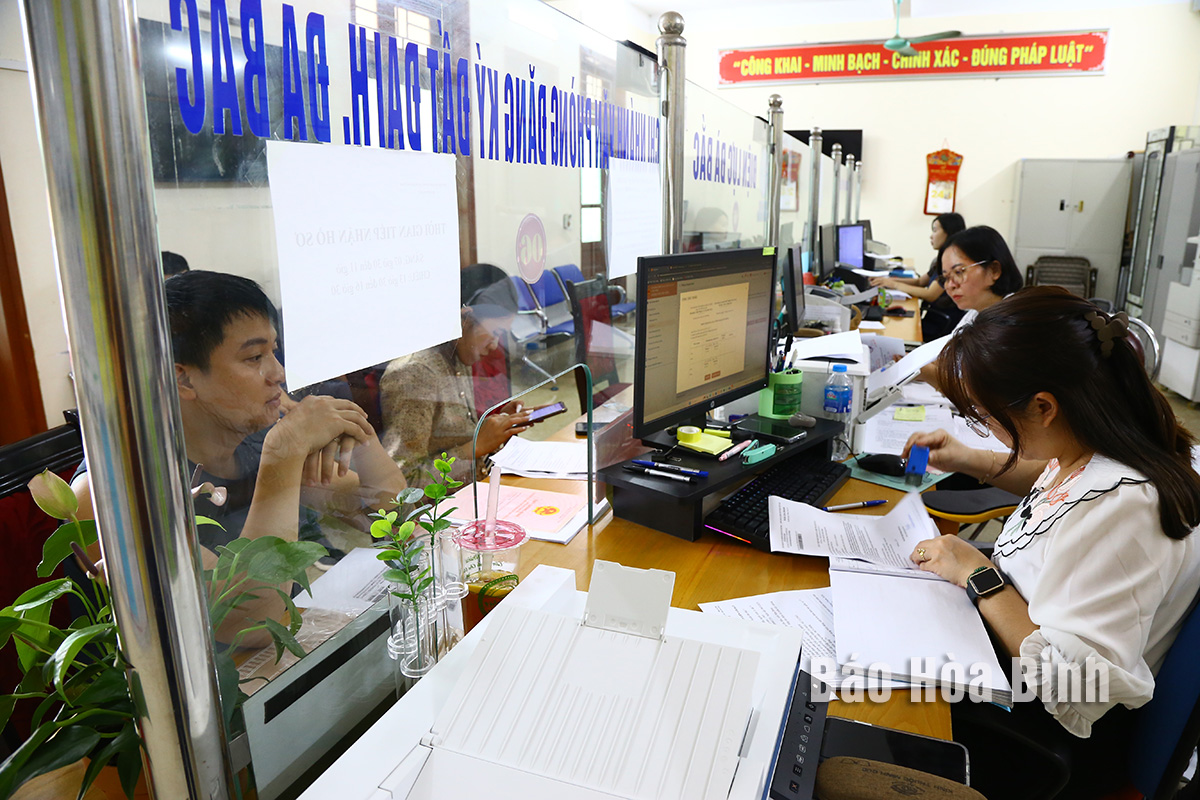
As a mountainous district still facing numerous challenges, Da Bac has made notable progress in advancing administrative reforms across various areas. The district has prioritised reorganising and streamlining its administrative apparatus, operating "one-stop-shop” units, and applying information technology (IT) in the handling of administrative procedures. Efforts have also been directed toward upgrading infrastructure and equipment to enhance service quality for residents and businesses.
The one-stop-shop division responsible for receiving and returning administrative procedure requests in Da Bac district has created favourable conditions for individuals and businesses seeking to complete administrative tasks.
Sa Thi Ngan, a resident of Da Bac township, shared her satisfaction after visiting the "one-stop-shop” unit to complete procedures for transferring land use rights. She praised the thorough guidance provided by the staff and the clear timelines for receiving results, which adhered to State regulations.
Luong Van Thi, Chairman of Da Bac district People’s Committee and head of the District Steering Committee for Administrative Reform, noted that since the beginning of the year, the district has issued directives on key administrative reform tasks. Administrative procedures, as well as channels for receiving feedback and complaints from individuals and organisations, have been made public on the district’s e-portal. Dossiers and outcomes are digitised in compliance with regulations.
Currently, all communes in the district have established modern "one-stop-shop” units to handle administrative procedures for residents and organisations. The application of IT in management, operations, and public services has contributed to administrative modernization and the development of a digital government in the locality.
As of now, all administrative procedure dossiers are processed online. In the first nine months of this year, a total of 13,438 applications for administrative procedures were received, including 536 at the district level and 12,902 at the commune level. The majority of these applications were resolved on time.
Despite these achievements, the district still faces challenges. The review and simplification of administrative procedures yielded limited results, and some agencies and units have not yet met established goals and standards. Additionally, the use of IT in management and operations has not been fully optimised.
To address these issues, the district plans to implement several solutions. According to Chairman Thi, communication efforts will be intensified to raise public awareness about the importance and impact of administrative reforms. Regular reviews and evaluations of administrative procedures will be conducted to propose timely updates and amendments. Greater emphasis will also be placed on IT applications to improve efficiency in handling administrative tasks and streamlining operations across agencies.
Furthermore, the district will strengthen oversight and monitoring to promptly address shortcomings, while recognizing and rewarding individuals and collectives for outstanding performance. Maintaining and improving the quality of "one-stop-shop” units at both district and commune levels will remain a top priority. Investments will continue in upgrading equipment to meet the standards set by the provincial Department of Information and Communications and align with the province’s roadmap for modernising administrative services.
Finally, the district will enhance inspections of public service activities and administrative reforms, with a focus on resolving bottlenecks and strictly addressing any negative behaviors or misconduct in the handling of administrative procedures.
Hoa Binh province is undergoing a dynamic transformation amid Vietnam’s national digital transition. Building on Poliburo’s Resolution No. 57-NQ/TW on breakthroughs in science, technology, innovation, and national digital transformation, the province has rolled out a wide range of practical action plans. A standout initiative is the "Digital Literacy for All” movement, an effort to ensure that no one is left behind in the digital era.
Hoa Binh province is undergoing a dynamic transformation in the wake of the national digital transformation movement. Building on Resolution No. 57-NQ/TW of the Politburo on breakthroughs in science, technology, innovation, and national digital transformation, the province has implemented a wide range of practical action plans. A standout initiative is the "Digital Literacy for All” movement ambitious effort to ensure that no one is left behind in the digital age.
With a spirit of unity and proactive problem-solving, the Party Committee, the government and the people of Dong Lai Commune (Tan Lac District) have made great strides in implementing the resolutions of the 24th Party Congress of the commune for the 2020 - 2025 term. Focusing on leadership and practical actions, the commune has brought the Party’s resolutions into daily life, creating strong impacts and pushing the local development forward.
Amid the nationwide push for digital transformation, young people in Hoa Binh Province are stepping up as dynamic pioneers, applying technology to enhance Youth Union operations and expand the reach of youth-led initiatives. Through creativity and adaptability, Youth Union organizations at all levels have introduced a series of practical solutions, contributing to modern governance and community development.
In recent years, An Nghia commune, located in Lac Son district, has stepped up administrative reform, focusing on improving the quality and efficiency of its single-window service unit for receiving and processing administrative procedures. These improvements have helped create favourable conditions for local residents and organisations to handle administrative procedures, contributing to the commune’s broader socio-economic development.
The Prime Minister-approved master plan to develop the multi-use value of forests ecosystems through 2030, with a vision to 2050, aims to improve the management and sustainable use of forest resources, create jobs, increase incomes, and improve the living standards of ethnic minorities, people in mountainous and remote areas, forest workers and those living near forests.



